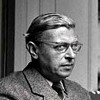“ A man is much more alive when he is what we call alive than when he is what we call dead ”
Samuel Butler, The Note-Books of Samuel Butler (1912). copy citation
| Author | Samuel Butler |
|---|---|
| Source | The Note-Books of Samuel Butler |
| Topic | |
| Date | 1912 |
| Language | English |
| Reference | |
| Note | |
| Weblink | http://www.gutenberg.org/files/6173/6173-h/6173-h.htm |
Context
“If it is said that no matter how wide a difference of condition may exist between myself now and myself at the moment of death, or how complete the forgetfulness of connection on either side may be, yet the fact of the one’s having grown out of the other by an infinite series of gradations makes the second personally identical with the first, then I say that the difference between the corpse and the till recently living body is not great enough, either in respect of material change or of want of memory concerning the earlier existence, to bar personal identity and prevent us from seeing the corpse as alive and a continuation of the man from whom it was developed, though having tastes and other characteristics very different from those it had while it was a man.
From this point of view there is no such thing as death—I mean no such thing as the death which we have commonly conceived of hitherto. A man is much more alive when he is what we call alive than when he is what we call dead; but no matter how much he is alive, he is still in part dead, and no matter how much he is dead, he is still in part alive, and his corpse-hood is connected with his living body-hood by gradations which even at the moment of death are ordinarily subtle;”
source



